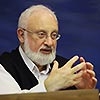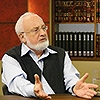Audio Version Of The Blog – 11.18.15
Listen to an Audio Version of the Blog
Download: MP3 Audio

Listen to an Audio Version of the Blog
Download: MP3 Audio
 Everything that happened with Korach and his companions was compelled to happen because the sons of Israel covered certain spiritual steps, reached the state named “Korach” and had to continue their advancement.
Everything that happened with Korach and his companions was compelled to happen because the sons of Israel covered certain spiritual steps, reached the state named “Korach” and had to continue their advancement.
This is when Korach’s rebellion took place after which he and his companions were “ingested” by the earth (i.e., new egoistic desires were identified).
When a soul reaches a state where it is impossible to believe that any egoistic desires can be present in it, they suddenly appear.
It’s amazing how things happen in nature: a person seems absolutely pure, however it’s enough to add ten grams of egoism to his soul and everything is soiled. This situation reappears at every level. It is said: “Do not trust yourself until you die,” i.e., until one’s egoism vanishes.
Everything described in the Torah should be understood as internal actions of a human being that have to be identified, correctly evaluated, dealt with, and as a result, we should rise to the level of bestowal and love through our surroundings to the Creator.
Question: Is it possible to jump over certain spiritual steps?
Answer: No, it is impossible! By doing so, we would be robbing ourselves. One has to slowly and carefully explore one’s own soul and accurately calculate how much one can receive in order to become similar to the Creator. This is what the chapter “Korach” is about.
[169235]
From KabTV’s “Secrets of the Eternal Book” 6/3/15
Related Material:
Model Of Desires
“Withdraw From The Dwelling Of Korach”
The Generation Of The Desert
 The Torah, “Numbers,” 18:25 – 18:29: The Lord spoke to Moses, saying: “Speak to the Levites and tell them, ‘When you take the tithe from the children of Israel which I have given you from them as your inheritance, you shall set aside from it a gift for the Lord, a tithe of the tithe.
The Torah, “Numbers,” 18:25 – 18:29: The Lord spoke to Moses, saying: “Speak to the Levites and tell them, ‘When you take the tithe from the children of Israel which I have given you from them as your inheritance, you shall set aside from it a gift for the Lord, a tithe of the tithe.
Your gift shall be considered for you as grain from the threshing-floor and as the produce of the vat. So shall you too set aside a gift for the Lord from all the tithes you take from the children of Israel, and you shall give thereof the Lord’s gift to Aaron the priest. From all your gifts, you shall set aside every gift of the Lord, from its choicest portion, that part of it which is to be consecrated.'”
The sacred part of the offering to the Lord is one or two hundredths parts of the total tithe.
The issue of tithing is explored in many Talmud treatises because it is a calculation that a person must produce in one’s desires by comparing them with the Creator’s properties of bestowal.
Therefore, while correcting our desires, we should categorize and split them in levels that we can work with: bestowing for the sake of bestowal, rejecting and transferring everything we have to others.
There are levels at which we still receive, but it is done as if we bestow. For example, when one’s life is dedicated to the quality of bestowal, even if one continues receiving in order to support one’s existence it is not considered to be receiving. There are many nuances in this matter.
The Torah speaks of correction at still, vegetative, animate, and speaking levels. In this world, correction at the first three levels occurs when people deal with plants and animals. In spiritual work, all three levels are inside each of us separately and in all of us together, in the common soul.
The fourth level is the level of “man,” (Adam) the speaking level. This state already includes such notions as slaves, foreigners, the people of Israel, Levites, and the Cohen and the interaction between them.
[169232]
From KabTV’s “Secrets of the Eternal Book” 6/3/15
Related Material:
Space For A Priest
Who Corrects the Tenth Part of a Desire?
Cohens And Levites – Properties Of Pure Bestowal
 Question: I cannot go above reason. Doubts and concerns “drill” my brain… Eventually, I find answers to my questions, but who knows if they are correct.
Question: I cannot go above reason. Doubts and concerns “drill” my brain… Eventually, I find answers to my questions, but who knows if they are correct.
My question is: What are the cases where I should go above reason? Never in my life would I not trust you, dear teacher, just like that, not agreeing with everything you say, but extremely speculatively. And where I do not understand, such as Talmud Eser Sefirot, I’ll simply trust your words because when it comes to things that I do not comprehend, it is as you say, anyway. It is faith above reason?
Answer: No, because when there is no knowledge there is no faith that can be built “above reason.”
[169193]
Related Material:
Calculate Your Faith
Jump Above Your Head
Rising Above Knowledge
 Question: What is the soul and how is it born?
Question: What is the soul and how is it born?
Answer: A soul is a certain space inside a human being in which one senses the upper world.
In an ordinary person living in this world, there isn’t a soul; there is only a point, an embryo, a drop of semen, from which develops the speaking level.
If one starts developing him or herself, submitting oneself to the Upper Light’s influence, the Light transforms the drop into a soul that develops from our Reshimo (spiritual informational record).
Question: Does a soul have a gender?
Answer: No. There are various modifications of the soul, but it doesn’t really matter. Each one of us has a soul. But at the same time, there is one common soul for everyone.
Question: How do we calculate the number of souls? Is it possible that is an excess of them?
Answer: What does “an excessive of souls” mean? The soul does not exist apart from a human being. If one develops it internally, then one has a soul. If not, one doesn’t have a soul. Each one of us is granted a chance to cultivate a soul and feel the next level of existence, the future world.
Question: What do souls do after death?
Answer: Souls do not die and have nothing to do with life or death of a physical body.
[169180]
From the Daily Kabbalah Lesson 9/27/15
Related Material:
The Sixth Sense, The Soul
Soul—One For All?
Who Has A Soul?
Preparation for the Lesson
| [media 1] | [media 2] |
Writings of Rabash, Letter 25
| [media 3] | [media 4] |
Writings of Baal HaSulam, “600,000 Souls”
| [media 5] | [media 6] |
Writings of Baal HaSulam, “Preface to the Sulam Commentary”
| [media 7] | [media 8] |